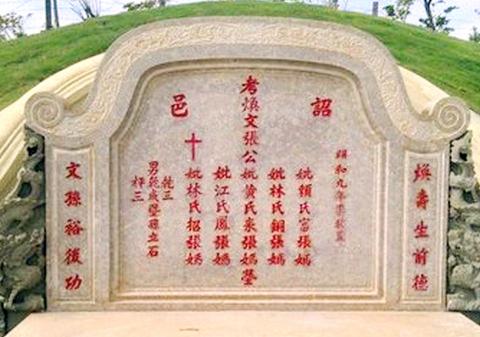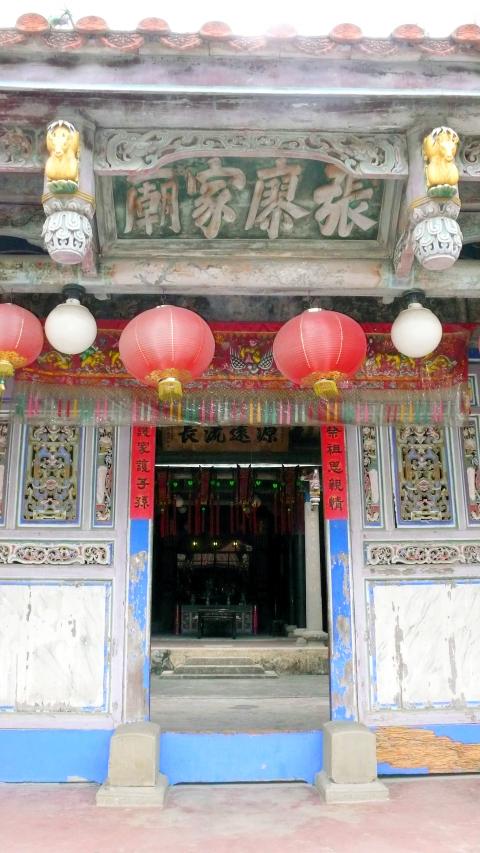There is a certain group of people in Greater Taichung’s Situn and Nantun Districts with the surname “Liao” who get their surnames changed to “Chang” after they die. “Chang” is inscribed on their ancestral gravestones and this has become a special tradition in the area. Some of these people have even chosen the compound surname of “Chang-Liao” so that their names don’t have to be changed after they die.
The family names Chang and Liao originate from Zhangzhou, in China’s Fujian Province. Genealogic records suggest that a man surnamed Chang, who was known as “Chang the Honest,” living around the transition period between the Yuan and Ming Dynasties, married into a Liao family. Chang only had one son and to ensure that both names would continue to be passed on, he stipulated in his will that his descendants will be surnamed Liao to honor the maternal family, but they must have their surname changed to Chang when they die to preserve the paternal surname.
The ancestral home of the Liao family in Greater Taichung is the Chang-Liao Family Temple in Situn District and has been named a historical monument by Greater Taichung City Government.

Photo: Lin Liang-che, Liberty Times
照片:自由時報記者林良哲
Taichung’s Liao family members use the surname Liao on their household registrations, identity card applications, military service documents or commercial contracts. However, as soon as they pass away, their surname must be changed to Chang on the family memorial tablets, gravestones, obituaries and family trees.
The tradition surrounding this surname is quite unique. In some cases, when people are not aware of the situation and receive an obituary notice with the surname Chang from a friend or parent surnamed Liao, they think it’s a mistake or a misdirected mail.
An example is the Liao Huan-Wen Tomb that is an official historical monument of Greater Taichung City Government. Liao Huan-wen used to live in Nantun. After he died, his descendents changed his name to Chang on the gravestone they made for him.

Photo: Lin Liang-che, Liberty Times
照片:自由時報記者林良哲
Besides Situn and Nantun Districts in Greater Taichung, this special tradition also exists in Yunlin’s Siluo Township. The well-known area known as the “Ci Kan of Siluo” was developed by Liao family members who came to Taiwan, and people there keep this tradition.
Although “living as a Liao and dying as a Chang” has become a tradition for some of the Liao families in Taichung’s Situn and Nantun Districts, some of them opted for the compound surname of “Chang-Liao,” so that they do not have to worry about their names being changed after they die.
(LIBERTY TIMES, TRANSLATED BY TAIJING WU)
台中市西屯、南屯一帶的廖姓家族姓氏會「轉換」,在活著時姓「廖」,過世則改姓「張」,祖先墓碑姓氏都是「張」,成為當地特殊的姓氏習俗,但其中一房則直接複姓為「張廖」,不再變換姓氏。
張廖氏始於中國福建省漳州府,根據族譜記載,元末明初時,張愿仔為廖家所招贅,後來他只生一子,為傳承二姓立下遺囑,規定「子孫生當廖姓,以光母族,死當姓張,以存父姓」。
廖姓家族台中市的祖厝是位於西屯區的「張廖家廟」,為台中市定古蹟之一。
台中廖氏家族中成員不管是戶籍、身分證、兵役資料、買賣契約等,都以廖姓來登記,但一過世,家中的神主牌位、墓碑、訃聞、族譜等,都要改為張姓。
此一姓氏習俗相當特殊,不知典故的人若是遇上廖姓友人的父母過世,接到訃聞,發現其載明為「張公」或是「張媽」,還以為寫錯了,或是發錯訃聞。
以台中市市定古蹟「廖煥文墓」來說,墓主廖煥文是南屯一帶名人,過世後,其子孫為他所營造的墓碑,也載明是「煥文張公」。
這種特殊的姓氏習俗除了在台中市西屯、南屯一帶外,也存在於雲林西螺,著名的「西螺七崁」正是由廖姓族人來台所開拓,也保留此一習俗。
雖然「活廖死張」是台中市西屯南屯一帶部份廖姓家族的傳統,但其中有一房卻直接複姓為「張廖」,不再生死兩姓。
(自由時報記者林良哲)

As we bundle up in thick coats to stay warm during the winter, there is a population that has already adapted to extremely low temperatures. These people live in the remote city of Yakutsk, the coldest city on Earth. Yakutsk is situated in the heart of Siberia, which is the capital of the Sakha Republic in Russia. This historic mining city began to flourish in the 19th century following the discovery of gold deposits. Given its construction on permafrost, the average temperature in the city remains below 0°C for over half the year, with winter temperatures dropping to an astonishing -50°C.

本文由生成式 AI 協作,本刊編輯編修。 Have you ever wondered how an athlete who once performed flawlessly can unexpectedly struggle with the simplest tasks? Imagine an __1__ pitcher who suddenly can’t find the strike zone—this is the “yips” in action. This __2__ phenomenon primarily affects athletes in sports like baseball and golf. It is characterized by a sudden loss of motor skills, leading to difficulties with routine actions that were __3__ before, such as a pitcher’s throw or a golfer’s putt. For instance, American baseball pitcher Steve Blass, who had a stellar performance in the 1971 World Series, suffered a sudden inability

A: Apart from 2NE1, Rain and Maroon 5, Japanese band Yoasobi is set to hold two shows in Taipei this weekend. B: Yoasobi? A: Yoasobi is a J-pop duo formed by Ayase and Ikura in 2019, and it’s loved by young people. Haven’t you heard? B: Oops, I’m feeling a little old. A: It sings the theme songs of “Oshi No Ko” (“My Idol’s Children”) and other TV series, leading it to gain popularity among young people. A: 除了2NE1、Rain、魔力紅,日本熱門樂團Yoasobi本週末也將連唱兩場。 B: Yoasobi樂團? A: 這是由Ayase、Ikura在2019年組成的雙人團體,近年來大受年輕人歡迎!你沒聽過嗎? B: 天啊我覺得自己老了。 A: 他們唱了《我推的孩子》等人氣影視作品主題曲,所以大受年輕人喜愛。 (By Eddy Chang, Taipei Times/台北時報張聖恩)

A: Happy Year of the Snake! Did you do anything special during the Lunar New Year holiday? B: I went to K-pop girl group Apink’s concert. How about you? A: I just stayed at home. But I’m going to girl group 2NE1’s show on Saturday. B: Wow, I really love their megahit “I Am the Best,” better known by its Korean title “Naega jeil jal naga.” A: I’m so glad that 2NE1 reunited last year, eight years after they disbanded in 2016. A: 蛇年快樂!你春節有做什麼特別活動嗎? B: 我去了南韓女團Apink的演唱會,你呢? A: 我都宅在家裡,不過這週六要去韓流天團2NE1的演唱會。 B: 我愛該團神曲《我最紅》,韓文歌名《Naega jeil jal naga》超洗腦。 A: 她們2016年解散8年後,去年終於合體真令人開心。 (By Eddy Chang, Taipei